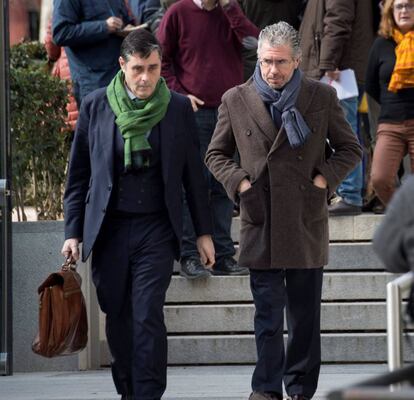The Popular Party: Caught in a quagmire of corruption
A string of graft cases making their way through the courts is eroding the credibility of the governing party in Spain

The more than 50 court proceedings investigating corruption by leading members of the Popular Party (PP) offer a bleak picture of the political group, which is headed by current Prime Minister Mariano Rajoy. The accusations made in court on Monday by Francisco Granados, once one of the party’s most powerful figures in Madrid and now a target of the Púnica graft probe, should be taken cautiously. After all, he is a defendant who is out on bail after spending considerable time in pre-trial detention, and he has the right to lie to the judge.
The Popular Party is trapped in its own rhetoric
But that is poor consolation for the PP, which now finds itself cornered by the testimony of a significant number of whistle-blowers and individuals under investigation who are seeking to strike a deal with prosecutors in order to reduce their own sentences, or just to get even with bosses and colleagues who have so far avoided the stand.
Granados is just the latest person to join a list that includes Ricardo Costa, Francisco Correa, Pablo Crespo, Álvaro Pérez, Luis Bárcenas, Edmundo Rodríguez Sobrino and David Marjaliza, among others.
All these cases share a similar structure: bribes, fake invoices and millions of euros diverted into private pockets and political campaigns. This improved the odds of remaining in power, and simultaneously oiled the corrosive machinery of what can safely be described as the most corrupt party in the history of Spanish democracy. Valencia and Madrid were the main bastions where campaigns were funded and politicians bought off.
Case after case proves that the PP engaged in illegal funding
Granados’ statements are especially harmful to former Madrid premier Esperanza Aguirre, who was once the boss of a great many corrupt officials. But the testimony also affects current premier Cristina Cifuentes, whose efforts to disassociate herself from the Madrid PP’s darkest period of corruption cannot conceal the fact that she has been involved with the party for the last 27 years.
Case after case proves that the PP engaged in illegal funding at the national and regional levels. Its actions have scandalized Spanish society, which confesses to being concerned about political corruption in this country – the other side of the Spain Brand. Corruption is the worst enemy of the Popular Party and of its visible leader. And Mariano Rajoy is ultimately responsible for this behavior and the lack of response to it. The opinion polls are clear: Ciudadanos is surging ahead of the PP and up to 62% of PP voters feel that Rajoy should step aside, according to a Metroscopia poll. The improved economy, which Rajoy rightfully boasts about, is of little use: 53% of Spaniards feel that the improvement has nothing to do with the government’s policies.
Up to 62% of PP voters feel that Rajoy should step aside
This latest court episode confirms the depth of the quagmire that the PP is caught in. It also suggests upcoming revelations even as Rajoy closes ranks and ignores the anti-corruption pact he signed with Ciudadanos and the warnings by the Council of Europe regarding Spain’s lack of effective corruption prevention measures.
The PP is trapped in its own rhetoric. At the time, it defended its innocence and said all cases were a matter for the courts. But now that the courts are taking up the matter and the truth is beginning to emerge, the PP says these are all things of the past that nobody cares about anymore. And then it seems surprised at its own inability to convince Spaniards that it is truly committed to a regeneration process.
English version by Susana Urra.
Tu suscripción se está usando en otro dispositivo
¿Quieres añadir otro usuario a tu suscripción?
Si continúas leyendo en este dispositivo, no se podrá leer en el otro.
FlechaTu suscripción se está usando en otro dispositivo y solo puedes acceder a EL PAÍS desde un dispositivo a la vez.
Si quieres compartir tu cuenta, cambia tu suscripción a la modalidad Premium, así podrás añadir otro usuario. Cada uno accederá con su propia cuenta de email, lo que os permitirá personalizar vuestra experiencia en EL PAÍS.
¿Tienes una suscripción de empresa? Accede aquí para contratar más cuentas.
En el caso de no saber quién está usando tu cuenta, te recomendamos cambiar tu contraseña aquí.
Si decides continuar compartiendo tu cuenta, este mensaje se mostrará en tu dispositivo y en el de la otra persona que está usando tu cuenta de forma indefinida, afectando a tu experiencia de lectura. Puedes consultar aquí los términos y condiciones de la suscripción digital.








































